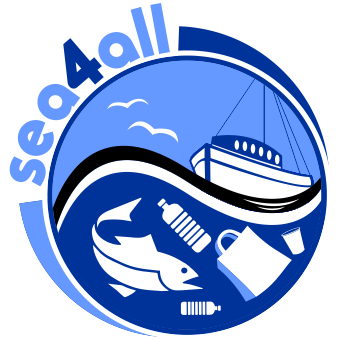Intellectual Outputs
In the framework of the Erasmus+ funded project “Enhancing critical thinking in schools for marine pollution using innovative ICT technologies (Sea4All)”, five intellectual outputs will be produced by the strategic partnership and their expertise.
01. Training Curriculum
A training curriculum will be created and will be used for the teachers’ professional development in the issues of marine protection and conservation. The training curriculum development will be based on the combination of three professional development models: the Collaborative Resource Development and Adaptation Model, the Action Research Model and the Whole‐of‐System Model, in order to provide to the trainers and the trainees various and diverse opportunities to use it indoors (in school) and outdoors in various environmental settings as Environmental Education Centers, coastal areas, sea museums, aquariums, labs, etc. The training curricula will use the ESD teachers competencies adapted to the specific issue of the project. This training curricula will bridge the gap between theory and praxis, since practically will familiarize the teachers with the handbook activities and platform in a concrete and holistic way and will equip them with tools, ideas, lessons that will support and make the able to work with those issues more concretely.
02. Technological Developments In Marine Pollution
This output will study and communicate small-scale oil spills and harmful floating debris affecting the marine environment, with special emphasis on coastal ecosystems and the marine trophic webs. High spatial and temporal resolution meteorological, oceanographic, geomorphological, geological and marine ecological data will be collected from various databases. These will be combined to predict, but also to communicate, the impact of small-scale oil spills and harmful floating debris. This material will be included in the rest of the intellectual outputs as part of the modern environmental techniques to face the problem of marine pollution due to oil spills and floating debris.
03. Creation Of An E-Learning Platform
The e-learning platform will be an on-line platform so that it can be accessed from almost everywhere and will support multilingual environment. Moreover, among other activities and resources that will be incorporated in the e-learning platform, packages will be created for training content to follow and conform to e-learning standards (e.g. SCORM), allowing to share, reuse and expand context. It will be used for training and spreading knowledge, offering synchronous and asynchronous access. The content will be elaborated appropriately for an e-learning platform, mainly contributed by the Technological developments in Marine Pollution and taking into consideration the educational aspects.
04. ICT Based Learning Game
An innovative ICT based on-line learning game will be developed, to advance skills, promote and motivate in a playful manner the learners for responsible behaviors, achieving the greatest positive impact, through the use of ICT. It will give the opportunity among other innovative features to present multimedia content, simulate processes and structured stories/scenarios (elaborated content appropriate for the game formats and mechanics, mainly contributed by the Technological developments in Marine Pollution. For the development of the on-line game not only innovative technologies are required but also sophisticated didactical usage concepts in order to be successful and effective for comprehensive educational tasks. The learners will\ become familiar with another way of learning by doing things rather than listening or reading having the possibility to improve their comprehension and information retention rate. ICT learning games have the potential to be a significant tool for training due to the learner’s interaction that should be encouraged, the attractiveness of the games as well as the immersive activities.
05. Pedagogical Handbook
The Pedagogical Handbook aims to provide in depth information, basic concepts, definitions and innovative methodological approaches on marine pollution in School Education. It will be developed on the basis of the theoretical framework and competencies identified within the Curriculum and the Technological Developments in Marine Pollution. The Pedagogical Handbook will base on interactive pedagogical methods and will combine the theory of Sustainable Development and Environmental Pedagogies in order to support the teachers to understand how to use the the serious computer games and e-leaning platform more effectively in a holistic way, in various and diverse ways.
